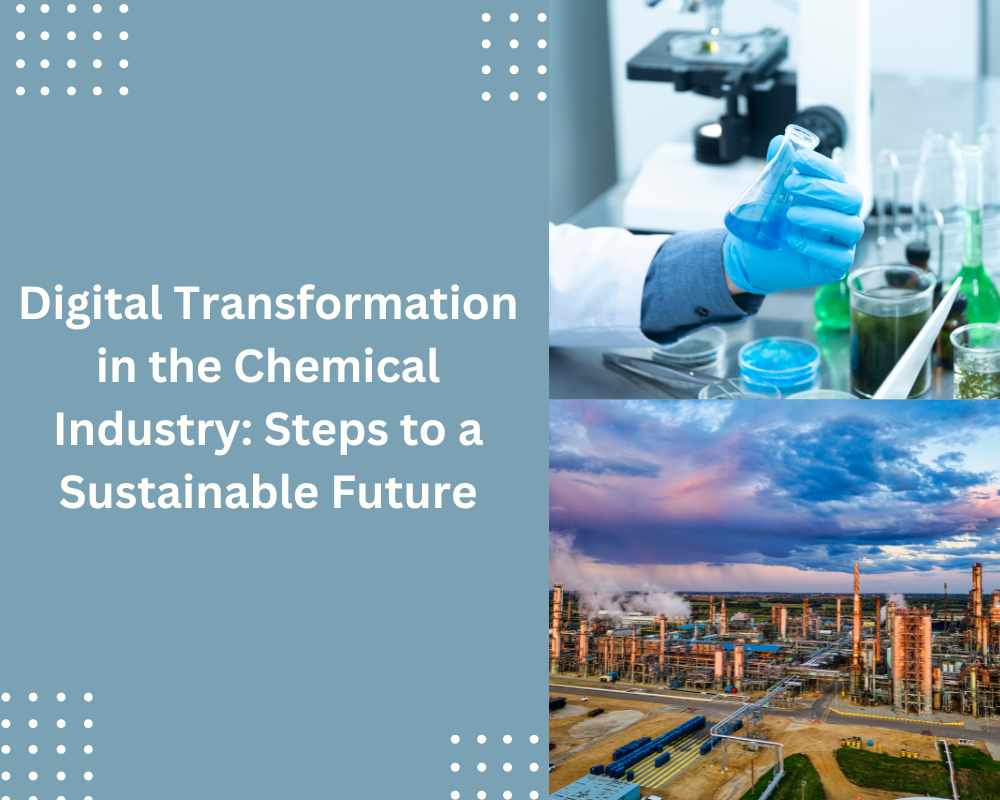Have you wondered about the chemical industry’s digital transformation? How to do it? Many people do so. In the chemical industry, it is challenging to transform it digitally. But, still, many companies are choosing digital transformation for many benefits.
Usually, the digitalizing chemical industry needs digital tools and AI solutions. They may sound new to many, but implementing them is not that much tough.
Before doing so, you must overcome the traditional challenges first. This is what Warsaw Chemical has done to adapt to digital transformation. So, what are these challenges? You will get it in this blog.
Here, I will share digital tools and AI solutions for digital transformation in the chemical industry and also how to overcome challenges. Let’s start the discussion with the challenges of this industry.
Challenges in Traditional Practices Of Chemical Industry Digital Transformation
You will face some challenges in traditional practices of the chemical industry. Have a look at these challenges together:
Challenge 1: Managing Data Integration and Quality
Dealing with the vast amount of data from various chemical processes sources is tough. Making sure it is accurate and well-integrated is crucial for making smart decisions.
However, using strong data management systems and investing in tools to clean and validate data can help solve this problem.
Challenge 2: Updating Legacy Infrastructure
Many chemical companies have old equipment and systems that don’t work well with new digital technologies. To fix this, they need to slowly start using digital tools while also upgrading their old systems.
Choosing flexible, scalable technologies that easily fit their existing setup can make this transition smoother.
Challenge 3: Dealing with Change
Employees used to doing things the old way might resist new digital processes. Giving comprehensive training and education can help them grasp these changes. Also, fostering a culture where people are open to trying new things can make this transition smoother.
Challenge 4: Keeping Data Safe from Cyberthreats
Chemical companies need to protect themselves from cyberattacks as they share more data online. They should have strong security measures and clear plans to keep their information safe.
Read: 8 Things Leaders in the Business Process Outsourcing Industry Want You to Know
Challenge 5: Regulatory Compliance
In the chemical industry, there are lots of rules. Going digital can add complexity. But, working closely with regulators helps. Using digital tools makes paperwork easier.
Digital Tools for the Sustainability of Chemical Industry Digital Transformation

Using digital tools is essential for driving the chemical industry towards sustainability during its digital transformation. These tools address key challenges like waste reduction, teamwork enhancement, and understanding environmental impact.
By implementing data and analytics, companies can work more efficiently, automate tasks, and ensure compliance with regulations. Digitalization also fosters innovation, continuous improvement, and customer focus.
Also, it assists with HSEQ management, ensuring safety, legal adherence, and a positive image. With effective management, digital tools make chemical operations safer, greener, and more competitive, benefiting everyone’s future.
AI Solutions for Sustainable Chemistry
AI solutions are transforming how chemistry works sustainably. Nowadays, most chemical companies are putting just as much focus on being sustainable as they are on making profits.
But even with efforts to be greener, many processes still rely on harmful materials like solvents and fossil fuels, creating waste and greenhouse gases.
Finding eco-friendly alternatives for each of these processes is a long and expensive journey. However, thanks to AI, there’s now a quicker path to making these changes and driving innovation.
AI tools dig through heaps of data to find ways to improve chemical processes. They can suggest cleaner ways to manufacture chemicals and ways to boost productivity.
As more companies jump on board with AI, ensuring that the data they’re using is accurate becomes super important. Good quality data helps AI models work better and avoid messing up.
With AI and solid data, the future of sustainable chemistry is looking brighter. Companies can discover new methods for making chemicals that are better for the environment. It leads to some breakthroughs in the field.
Read: How the Rise of PayTech is Reshaping the Payments Landscape
Meeting Regulatory Demands
Meeting regulatory requirements in the chemical industry is a real challenge. Regulations vary across regions and are frequently updated to match new scientific and technological advancements.
This dynamic environment makes it difficult for companies to ensure compliance. Many invest heavily in specialized teams to handle these complexities.
Usually, compliance involves a lot of paperwork. This includes detailed records of chemicals, manufacturing processes, and safety information. It is a time-consuming task that often takes attention away from other important activities.
However, there are ways to streamline the process. Implementing effective systems for managing data and tracking changes can simplify compliance efforts.
With the right tools, companies can stay organized and meet regulations without sacrificing focus on crucial research endeavors.
Strategies for Chemical Industry Digital Transformation
The chemical industry is essential for our daily needs. However, this industry contributes significantly to climate change through hazardous substances and emissions. To address this, there is growing interest in using digital technologies to foster sustainable solutions.
Digital transformation involves reimagining and optimizing chemical processes to reduce environmental impact. However, the success rate for businesses adopting digital transformation is only around 30%, often due to inadequate planning.
To succeed, companies must deeply understand digital technologies and collaborate with strategic partners for effective implementation.
By establishing a solid data foundation and proficiently managing knowledge, digitalization can streamline workflows and minimize environmental footprint.
This helps companies in achieving sustainability objectives. It also helps them to survive with the competitors.
The chemical industry can play a key role in making our future greener by using digital methods. This involves finding new ways to innovate and boost the economy while also reducing harm to the environment.
Future Success: Three Key Pillars
The chemical industry is getting ready for the future. There are three important areas where companies need to focus. These areas are:
Growing and Innovating
Think of industries like cars, building stuff, and farming. They are all changing fast, which brings lots of chances and challenges for chemical companies.
With new tech like 3D printing shaking up how things are made, there’s a need for different materials.
So, to stay ahead, chemical companies are rethinking how they grow, and trying out new digital services. They are also coming up with fresh ideas to match what people want.
Getting Better and Cheaper
Going digital is about using fancy new tech in the plants. Ut, it is also about doing better and saving money all around.
By mixing stuff like blockchain and smart predictions with what they’re already using, companies can keep better tabs on their products and get more done with less.
And hey, finding new ways to make things, like turning crude oil straight into chemicals in refineries, saves cash and helps the planet.
Keeping it Green and Reusing Stuff
With rules getting stricter and people wanting greener goods, being eco-friendly is a big deal. Chemical companies are teaming up to make things that are better for the planet.
These companies are investing in recycling, and using more stuff that can be used again. By changing how they do things to be more eco-friendly, they are tackling problems like plastic waste head-on.
End Note
Finally, now you know the importance of the chemical industry’s digital transformation For a better and digital future you must work on challenges like data management and adapting to new technology.
By working together and using tech, we’re finding better ways to do things that also help the planet. It saves money and is eco-friendly. If we focus on these goals, we can make the world better for everyone.
Author’s Bio:
Sally brings 26 years of experience to Warsaw Chemical. She began in Sales, managing customer training seminars. Later, she moved to Content Writing, crafting tech sheets for Warsaw Chemical and its customers.

